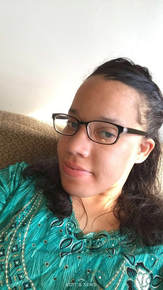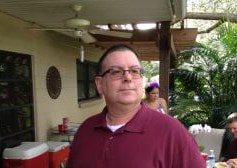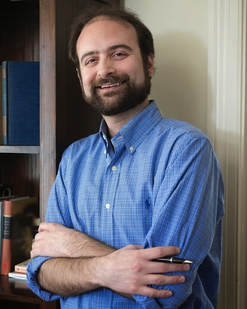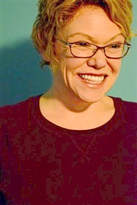 Tara Olinger is a creative writing major with a background in education. Tara is currently attending Full Sail University pursuing her Bachelor’s in Creative Writing for Entertainment, with the plan to complete her Master’s in Creative Writing there as well. She has an Associates of Applied Science in Early Childhood Education and Management. She has over six years of experience working in the childcare field in various settings, from being an AmeriCorps Reading Tutor to currently working as both a Para Educator and a Counselor at the YMCA. Tara aspires to become a published author by the time her work at Full Sail is complete. LATE NIGHT ART It was dark and the flashlights only reached so far in the museum’s main room. The taller man with the moustache, Jeff, looked down at his watch. The time was 1:24 A.M. “We’ve got one hour,” he said. The shorter man with glasses, William, nodded in agreement as they scoped the rooms.
The walls in the main building were lined with tacky green wallpaper on the upper half and a faux wood paneling on the bottom half. The top half was lined with many works of art, most outlined in luxurious golden frames. There were chairs throughout the room, for art enthusiast relax while gazing upon the works of art. The room smelled old, like mothballs and antiques. William and Jeff looked throughout the main gallery until Jeff spotted the first piece of art they would take, the one they had set out for in the first place. It was a Rembrandt original; this information was acquired from a tour they had taken a few months back when they first began to build this master heist. “Here, help me with this frame, it’s heavy,” said Jeff. “Here, I’ve got it,” replied William. “Grab me the box cutters would ya?” William threw the box cutter to his mustached accomplice and Jeff cut the painting from its frame. They heard footsteps approaching. “Who’s in there?” the voice asked. They dare not answer. “Quick, get on that side of the door,” the taller one said. “When he comes in, we’ll tie him up too.” The shorter man nodded. The man walked through the door with his flashlight and the two intruders took him down, they tied him up, duct taped his head and left him on the floor until they were done. Then they went back to business. They removed the work from the frame and the taller one held it up, while William shown the light on it. “Would you look at this beauty,” the Jeff one said. “Just a few more to go.” “Are you sure you want to go through with this?” asked William. “You’re kidding, right?” “Not really, this is a one of a kind, this one alone will be worth thousands if not millions,” William said. “Ah, yes. This is true, but if this is worth millions, imagine what five, ten more would be worth,” replied Jeff. “I guess you’re right.” “I am, now, quick let’s put this back in the truck and see what else we can take,” Jeff said. They took the piece out of the museum and quickly reentered the room where they scoped out a few more pieces they thought would be of fortune. They spotted some more pieces they remembered from the tour that were done by Rembrandt. They found a piece done my Vermeer that they remembered to be of significance. “What else?” asked Jeff. “How about this?” replied William, holding up an old piece of a flagstaff. Jeff rolled his eyes “sure,” as he threw it into the bag they had brought in. “I think that’s enough, not too much, not too little.” William nodded as they walked out of the room lined with blood red wallpaper, back into the green lined room. They crept past the security station. “Shit, we’ve got to go back and get him,” Jeff said. “What are we going to do?” William asked, “it’s already been over an hour.” “We’ll take him to the basement with the other guy and leave them both there.” “You’ve got it Boss.” The two went back into the main room and drug the tied up, curly headed man through the hall, down the staircase and into the warm, muggy basement. They shoved him into a corner near the security guard, checked the time “2:40 A.M.,” and they locked the door as they left the room. “We did it,” said Jeff. “I sure hope so, they could still find our finger prints, have surveillance videos,” replied William. “Shut up and get in the truck,” Jeff said. The two got into their truck and drove off with the various works of art, never to be seen again.
0 Comments
Anders M. Svenning has had short stories published in Forge Journal, Grey Sparrow Journal, The J.J. Outré Review, The Kentucky Review, and many more; he is the author of short story collection Nonpareil (Tule Fog Press). THE BEAUTY IN BEREAVEMENT |
Categories
All
|






 RSS Feed
RSS Feed